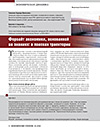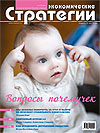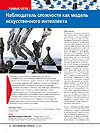Foresight of a Knowledge-Based Economy: in Search of Trajectory
The author considers three generations of foresight to identify the vector and the logic of its development in order to build theoretical foundation and methodology of foresight in a knowledge-based economy. The article reveals that as the new economy comes into being and develops, a shift from the paradigm of linearity to complexity paradigm, from considering an object under research as a closed and static system to adaptive, dynamic, open, self-organizing systems of a new complexity level, developing in a globalizing economy, in rapidly changing environments with high level of uncertainty, occurs. Theoretical basis should be the theory of evolution, complexity and chaos.





